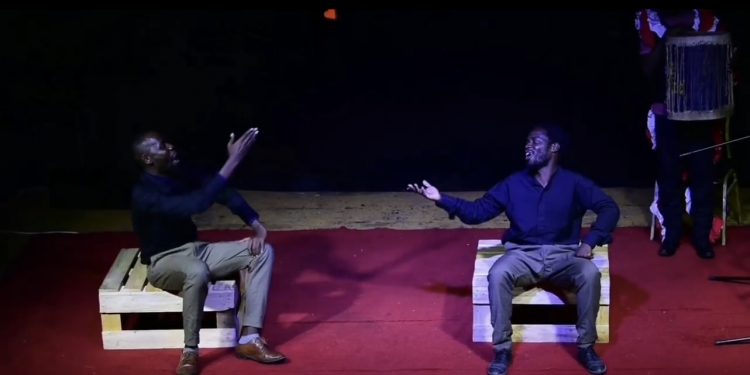I was a little late to the venue, and while passing through the Kenya National Theatre gates overheard a woman talking to someone while looking at a poster I recognised. The poster under discussion was for the play I was about to see. She said: “Eh, hiyo 1,000 bob ni mingi sana.” I didn’t catch the rest of her argument, because, again, I was late, and also, I had heard it all before. The value of theatre has dwindled, or rather its value in people’s opinion has dwindled. At the same risks that come with confessionals and self analysis, I was fifteen minutes late to the theatre but didn’t worry about missing anything myself. What would I miss? It wouldn’t even have started by then; the theatre of the country never takes anything that seriously. And I was right. After all that, I still found myself waiting in the auditorium for another ten minutes when the crowd that was expected to fill up the aisles, didn’t.
Late last year there was a Ghanaian play that ran under the same title Something Must Kill A Man, and little ol’ me walked into this expecting it to be just that, unprepared for the rude awakening I was to receive. This should have been apparent to me the moment I purchased that 1,000 Kenyan shillings ticket, seeing as it had two runs in quick succession. I might have asked myself how that would be possible. After stewing in uncertainty for the waiting period, and being treated to a wonderful band that played something sounding like Lingala, I realised everything wasn’t as I thought it was, in a manner of speaking.
A rather dapper and excited woman went on stage with a microphone and introduced us to the afternoon’s festivities. The audience was still pretty lean, but she announced that recording of the performance and pictures would be acceptable. Ground rules were stated and the show began at once. Something Must Kill A Man is essentially a two man show (which explains the two consecutive runs). These two men, old friends of the central character, tell the tale of Omwami. The performance is set during his funeral service, with a prop casket placed behind the two narrators. Besides the casket, the only other stage decorations include two seats and a fireside, the fire being creative red strands arranged over a fan that blew throughout the entire show.
The story of Omwami is the familiar tale of rise and fall. He’s a poor kid taken up by a rich Apostle who teaches him his ropes, and bequeaths him both his gifts and his demons. The Apostle has a wife, a High Prophetess, she’s referred to, who at one point tries to sleep with Omwami. The details of the story would be etched clearer in one’s mind had it been a conventional play, one which ironically would sound less conventional than what I experienced. Because in truth the play was two people simply telling us a story, with designated water breaks in which we, the audience, would be treated to some admittedly good music.
The story we were told was basically that of a man’s life. His struggles, his triumphs, his lovers, his shortcomings, and his inevitable destruction. When it all comes to it, as one can assume from the title, Omwami dies before his time, and the only consolation, the only conceit I can decipher throughout the whole story, is that while he ascended through a peculiar mix of honour and dishonour, he fell crashing in the same manner. A conventional story told in an even more conventional way, they have staged a play with no illusion, no poetry, and no wonder. The two narrators are lively and well spoken, funny and energetic in a way that prevents one from falling asleep, but does little for one’s boredom.
I am disheartened by the turn out. The theatre holds a heralded place in my heart, but I also understand the woman by the entrance bemoaning the price of admission. Why should she pay that much? I think that one-man shows, two-man shows are wonderful, but the next time I’m asked to pay 1,000 shillings for a ticket, it better be for an 1,000 shilling show. Moreover, when one conducts a simple Google search of the play, information and promotion for it is almost nonexistent. People enjoy these kinds of entertainment, and more would if they only knew about them, and were asked to doll out appropriate prices. Either the shows get better, more theatrical and galvanising—with poetry and beauty and immersion and grandeur, the stuff of good theatre—or the prices start corresponding to the effort. That’s what I think the woman by the gate was trying to say.
Enjoyed this article?
To receive the latest updates from Sinema Focus directly to your inbox, subscribe now.











